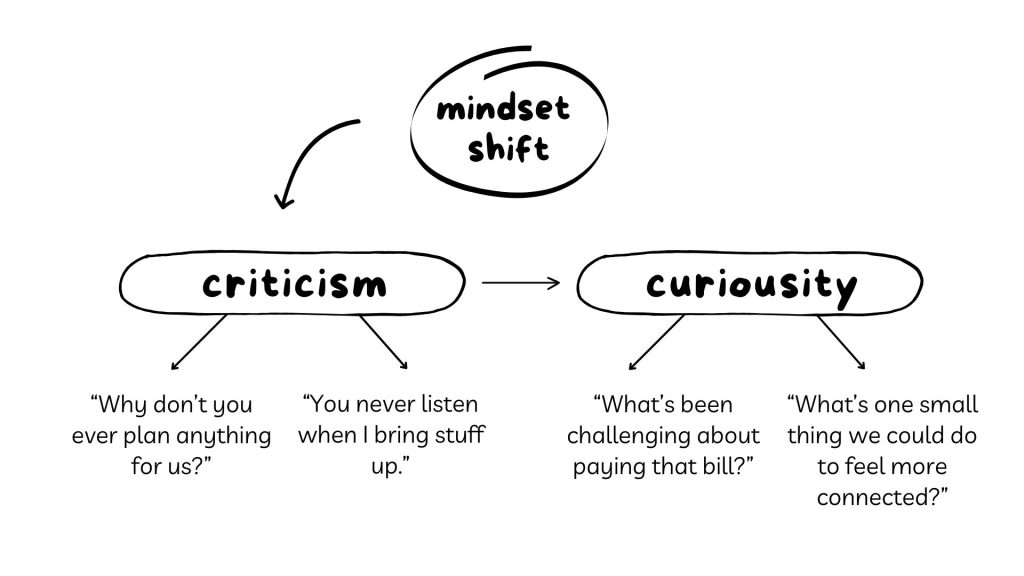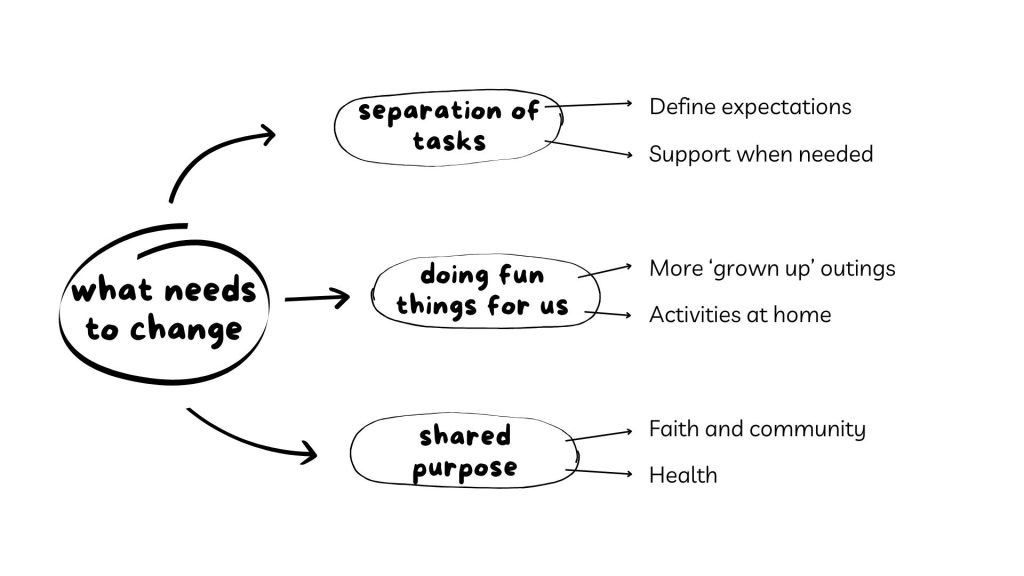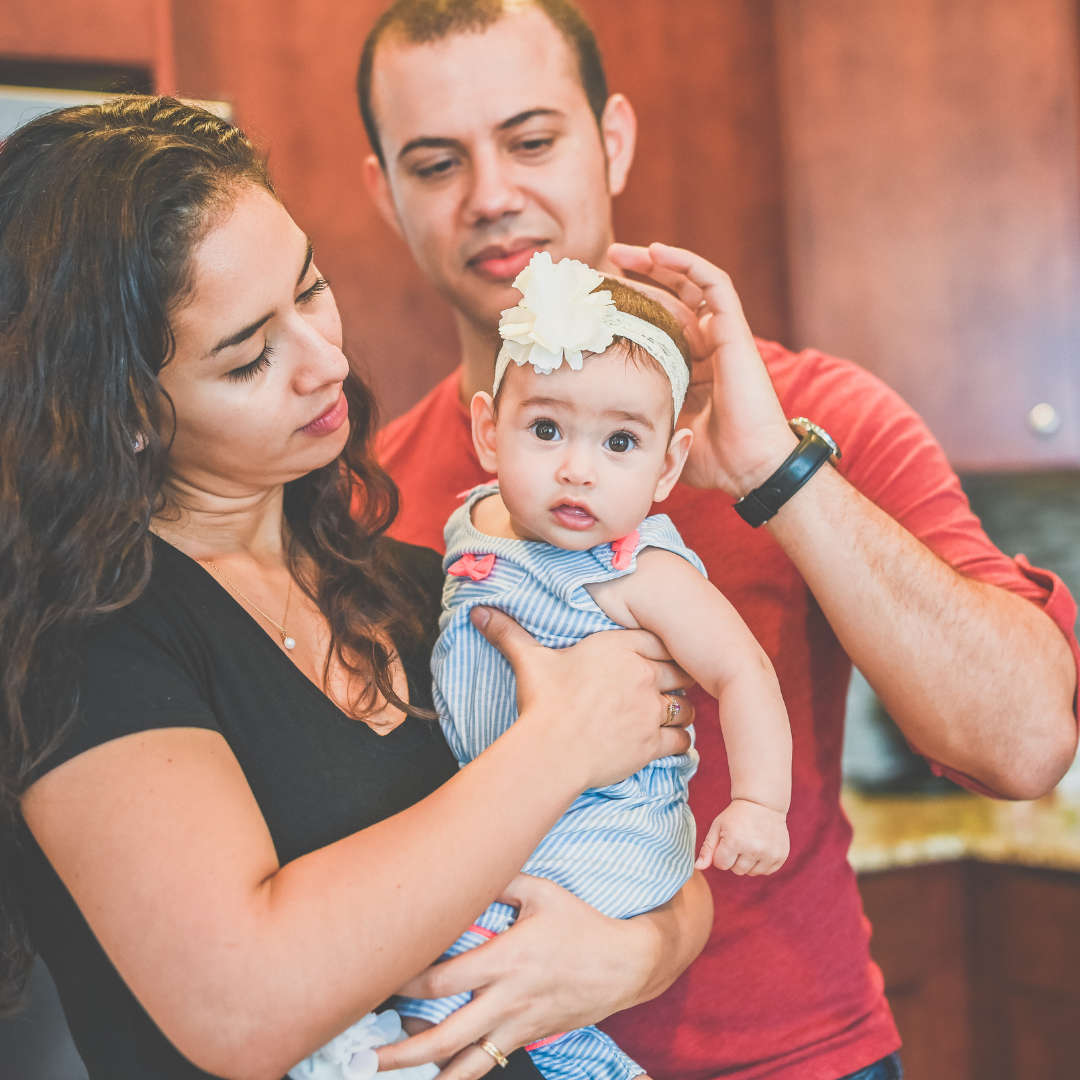15 minute relationship check in: what needs to change about your relationship?
What needs to change about your relationship?
We were sitting at Kids Kingdom, surrounded by offensively bright colours and the chaotic energy of children climbing, jumping, and shrieking. Not the most ideal time to do a relationship check in.
My husband and I were devouring a snack pack and kebab while we watched our toddler get hoisted to the third level of the play equipment by some sweet school kids.
I figured we had about 10 minutes. Stretch goal: 15 minutes, though that was really pushing it.
But I was determined to do a relationship check in.
“What do you think needs to change about our relationship?”
He didn’t even hesitate. “Everything!” he said with a grin, stuffing another chip into his mouth.
I laughed. But I was also thinking…
This was not the planned setting for this conversation.
As someone who designs experiences for a living, I had a whole session nerdily mapped out.
A structured relationship check in where we’d sit down, benchmark where we were, and create a clear plan to improve.
(Yes, my husband puts up with this. And I think secretly likes it.)
But for two weeks straight, I couldn’t find the right time.
There was always something more urgent.
Or sometimes there wasn’t – I just couldn’t muster the energy.
So here we were, squeezing a deep conversation between bites of kebab and the occasional toddler rescue mission.
It wasn’t perfect. But it was good enough.
How to do your own relationship check in
If I had waited for the “right time” to bring it up, I’d still be waiting.
Relationship check ins don’t need candles, a calendar invite, or a 5 hour deep dive into every past issue.
They can be:
- Lighthearted
- Mutual (one way venting builds resentment)
- Flexible (date nights aren’t always possible)
Any positive intention beats waiting for the perfect one.
But there’s one mindset shift that can change the tone of the entire conversation:
Curiosity over criticism.
Curiosity sounds like:
“What’s been challenging for you lately?”
“What’s one small thing we could do to feel more connected?”
Criticism sounds like:
“Why don’t you ever plan anything for us?”
“You never listen when I bring stuff up.”

I’ve recently learned something uncomfortable:
When I want to criticise my husband, it’s usually because I’ve written a whole story in my head.
- He didn’t wipe the benches? Must be glued to his phone.
- He didn’t call the bank? He’s probably procrastinating again.
- He asked me to help brush our daughter’s teeth? Lazy parenting.
None of these are facts. They’re assumptions I’ve emotionally committed to – so much so that I’ll play out entire speeches in my head, like I’m a layer closing a case.
Impressive? Maybe. Useful? Not even close.
Because now we’re not having a conversation.
We’re in a trial: me as the prosecutor, him as the defence.
Sound familiar?
You might still reach a solution.
But it’s a high-stakes, exhausting way to get there.
So you sometimes stay in the safe zone. Talking logistics, to-do lists, the weather.
Not because you don’t care – but because you’re avoiding having a disagreement.
Here’s the reframe to practise: Conflict isn’t the enemy. Avoidance is.
How to fight better
Research shows that couples who never fight are actually at higher risk of disconnection and divorce.
Why? Because silence doesn’t equal peace.
It often signals emotional disengagement.
Healthy couples don’t avoid conflict or relationship check ins. They repair.
Respect. Connection. Curiousity. That’s the difference.
Here’s how I’ve been practising it:
Whenever I feel the itch to criticise, I pause.
That’s my internal trigger.
Instead of launching into my monologue, I try to ask an open-ended question.
At first, it feels near impossible.
But when you manage it – even 1 in 10 times – you’ll often be surprised.
The response is rarely what you assumed. The tension diffuses. Fast.
The more you see this happen, the more your brain rewires for connection, not combat.
This isn’t about being perfect. It’s about changing the goal from “winning” to “understanding.”
And if the conversation still gets messy (it will), don’t retreat.
Use a repair attempt.
Try:
“I think I got defensive there. Let me try again.”
“I know this matters to you. I want to understand better.”
Conflict isn’t something to fear if you know how to repair.
The 3 areas of our relationship we’re working on
So here’s where we landed that day in Kids Kingdom, when I asked:
“What do we want to change about our relationship?”

1. Separation of tasks (and actually sticking to it)
We have a ‘tiny’ issue of being too involved in each other’s tasks.
One of us has a task, the other jumps in…and before long, we’re both frustrated.
I ask my husband to do something, then remind him 47 times.
I cook dinner, and he hovers with advice like he’s auditioning for MasterChef.
It looks like help. But it’s really about control.
Both of us are subconsciously trying to prevent old mistakes:
He forgets things. I’ve burnt pasta. Repeatedly.
But what the other person hears is: “You don’t trust me to handle it.”
In The Courage to Be Disliked, Adlerian psychology argues: Trust is built by separating tasks.
That means:
- If it’s his task, I don’t own it.
- If it’s mine, he doesn’t step in.
- We help only if help is requested.
Doing a regular relationship check in helps clarify these boundaries before resentment builds.
I was sceptical at first. “This is my house and my marriage – shouldn’t I make sure stuff gets done?”
But constantly stepping in = subtle micromanagement = slow erosion of trust = burnout.
Clear expectations = letting go = more confidence, more peace = more freedom.
So that’s our plan: Define our key responsibilities, stay in our own lanes, and try to support only when it’s needed.
2. Doing fun things for us (not just our child)
We went on a cruise recently – mainly for the toddler-friendly activities.
Yes, she loved the splash pool. But that wasn’t our first choice of activity.
So one evening, we brought her to karaoke at the pub.
She played table football. Had a smoothie. Danced on the floor.
Not a “kid activity” – but she had a great time.
And we loved doing something different.
Some of our best memories weren’t about what we planned for her.
They came from doing something we enjoyed – with her along for the ride.
That’s the shift we’re making:
More fun for us, with her included.
Because when your child sees you enjoying life, they learn how to enjoy it too.
3. A shared purpose beyond parenting
Most of our shared energy goes into:
- Parenting
- Running the house
Important. But it’s felt like something’s missing.
A mission that’s just ours.
Of course, we’re united in raising our daughter.
But she can’t be the only centre of our relationship.
That’s not healthy for her – or for us.
Couples thrive when they’re building something meaningful together.
It could be a project, a value, a cause, a shared experience.
For us, because we’re on a faith journey, this might look like:
- More intentional prayer and Bible study together
- Volunteering at church or in the community
- Making deeper connections with people we care about
(I also suggested doing Couch to 5K. Still waiting on that one…for now, it’s a solo mission.)
Start with a shared value – growth, faith, health, creativity.
Then find something to build from there.
A relationship check in can be a great place to start that conversation.
It’s something meaningful you can involve your kids in.
A deeper foundation for your family.
The takeaway
You don’t need the perfect setting or the perfect words to do a relationship check in.
Start where you are. Snack pack in hand. 10 minutes is enough.
- Be curious, not critical. Ask questions, not make accusations.
- Don’t avoid conflict – learn to repair. Messy is better than disengaged.
- Start with what’s working. People are more open to discussing what’s not when they feel seen. (something I should’ve done at Kids Kingdom!)
- Keep it short and simple. One insight is more powerful than a two-hour talk that goes nowhere.
- Act on what you learn. A great conversation means nothing if nothing changes.
You don’t need to overhaul everything.
Just choose one area. Take one step.
You might be surprised how much can shift – over a kebab, under fluorescent lighting, in the middle of a play centre.
You can read the prologue that led to our relationship check in here: Relationship Reset: The real time experiment in rebuilding love after baby (our experience)
What else would you like to know about relationship check ins?


